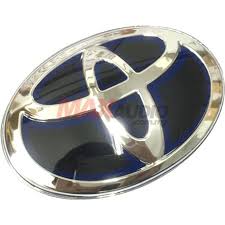
Japanese auto giant and the largest auto company in the world in terms of output Toyota Motor Corp would be partnering with Chinese battery makers as it aims to create a product portfolio that would have at least half of its stable full of electric cars by 2025.
The company said that the deadline for this new aim would be five years prior to what had been earlier set by it for itself and its tie up with battery makers would help it to achieve that accelerated business objective of electrification of its vehicles.
This announcement by the Japanese car maker reflects that intense competition that is currently prevalent in the electric car industry which is fast transforming into a separate global industry as well as the company’s admission that its own capacity of battery production would not be enough to meet the increased demands for electric cars that it would plans to manufacture
The company’s Executive Vice President Shigeki Terashi told a briefing that there "may be a gap" between the future need of for electric vehicle batteries for Toyota and its own production capacity for the same as the every stringent emission norms in Europe, Japan and China is fueling demand for electric vehicles.
To fulfill its need for batteries for electric cars, the company would be partnering with the leading Chinese battery maker Contemporary Amperex Technology Co Ltd (CATL), as well as Chinese EV maker BYD Co Ltd, Toyota said on Friday.
An ultra-compact two-seater car that has been designed for carrying out daily errands and for undertaking short-distance business trips was also announced by the company. This new vehicle would have a top speed of 60 km (37 miles) per hour and a travelling range of 100 km on a single charge.
However, profit margin would get reduce din the future even in the face of accelerating demand for electric vehicles, Terashi noted. He said that despite the technology behind electric vehicles has advanced to a significant degree since 2010, development of a profitable business model based on such electric powered vehicles remains a challenge for car makers. \
He said that by 2025, compared to the completely electric powered vehicles, the sale of hybrid vehicle would be less with the sale of the hybrid vehicles is expected to be less than a million units.
While being fast enough in development of technologies for hybrid and fuel cell vehicles, the Japanese automaker not been able to match up in the speed of bringing fully electric vehicles to showrooms in comparison to its rivals such as Nissan Motor Co Ltd, Volkswagen AG and Tesla Inc.
The company has been manufacturing lithium-ion EV battery technology for decades on its own and also partners with Panasonic Corp to jointly use available resources for the development and manufacture of rectangular-shaped prismatic batteries in the coming years.
The company also announced that it would be partnering with Subaru Corp for joint development of a battery-electric powered sport-utility vehicle (SUV) on a platform that would also be developed together in their attempt to share and reduce development costs.
(Source:www.auto.ndtv.com)
The company said that the deadline for this new aim would be five years prior to what had been earlier set by it for itself and its tie up with battery makers would help it to achieve that accelerated business objective of electrification of its vehicles.
This announcement by the Japanese car maker reflects that intense competition that is currently prevalent in the electric car industry which is fast transforming into a separate global industry as well as the company’s admission that its own capacity of battery production would not be enough to meet the increased demands for electric cars that it would plans to manufacture
The company’s Executive Vice President Shigeki Terashi told a briefing that there "may be a gap" between the future need of for electric vehicle batteries for Toyota and its own production capacity for the same as the every stringent emission norms in Europe, Japan and China is fueling demand for electric vehicles.
To fulfill its need for batteries for electric cars, the company would be partnering with the leading Chinese battery maker Contemporary Amperex Technology Co Ltd (CATL), as well as Chinese EV maker BYD Co Ltd, Toyota said on Friday.
An ultra-compact two-seater car that has been designed for carrying out daily errands and for undertaking short-distance business trips was also announced by the company. This new vehicle would have a top speed of 60 km (37 miles) per hour and a travelling range of 100 km on a single charge.
However, profit margin would get reduce din the future even in the face of accelerating demand for electric vehicles, Terashi noted. He said that despite the technology behind electric vehicles has advanced to a significant degree since 2010, development of a profitable business model based on such electric powered vehicles remains a challenge for car makers. \
He said that by 2025, compared to the completely electric powered vehicles, the sale of hybrid vehicle would be less with the sale of the hybrid vehicles is expected to be less than a million units.
While being fast enough in development of technologies for hybrid and fuel cell vehicles, the Japanese automaker not been able to match up in the speed of bringing fully electric vehicles to showrooms in comparison to its rivals such as Nissan Motor Co Ltd, Volkswagen AG and Tesla Inc.
The company has been manufacturing lithium-ion EV battery technology for decades on its own and also partners with Panasonic Corp to jointly use available resources for the development and manufacture of rectangular-shaped prismatic batteries in the coming years.
The company also announced that it would be partnering with Subaru Corp for joint development of a battery-electric powered sport-utility vehicle (SUV) on a platform that would also be developed together in their attempt to share and reduce development costs.
(Source:www.auto.ndtv.com)














